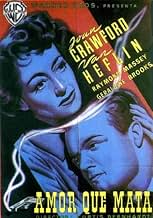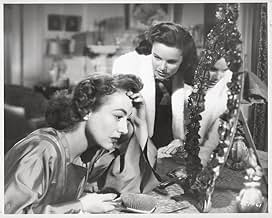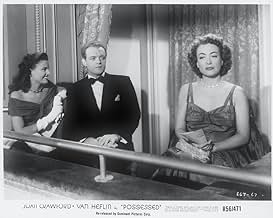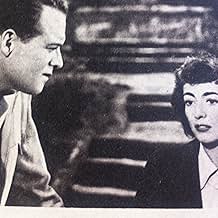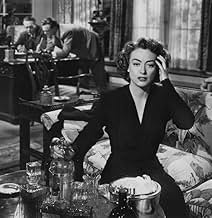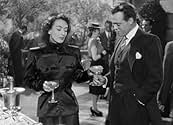CALIFICACIÓN DE IMDb
7.1/10
6.2 k
TU CALIFICACIÓN
Tras ser encontrada deambulando por las calles de Los Ángeles, una mujer gravemente catatónica le cuenta a un médico la compleja historia de cómo terminó allí.Tras ser encontrada deambulando por las calles de Los Ángeles, una mujer gravemente catatónica le cuenta a un médico la compleja historia de cómo terminó allí.Tras ser encontrada deambulando por las calles de Los Ángeles, una mujer gravemente catatónica le cuenta a un médico la compleja historia de cómo terminó allí.
- Dirección
- Guionistas
- Elenco
- Nominado a 1 premio Óscar
- 3 premios ganados y 2 nominaciones en total
Peter Miles
- Wynn Graham
- (as Gerald Perreau)
Jakob Gimpel
- Pianist
- (as Jacob Gimpel)
- Dirección
- Guionistas
- Todo el elenco y el equipo
- Producción, taquilla y más en IMDbPro
Opiniones destacadas
Joan Crawford was born to play this role. She's a scary woman. You can't fake those looks. With five marriages herself (even tho that wasn't the case in 1947, it was in her future) she knew this subject matter very well. I don't know what it is about Crawford, but she's scary. She seems so unbalanced as a person that this role was PERFECT for her.
I watched this film on cable (Turner movies) only to see who Raymond Massey was. As a Seinfeld fan, there's an episode where Kramer's physique is compared to Raymond Massey.he's got a `Raymond Massey like physique.'
I was drawn into the mood of the movie and Crawford's seriously co-dependent personality. Her portrayal of a possessed woman in love was dead on. Many times these type of women look so perfect on the outside, working in a `servant' type position, so quiet on the outside with a wicked inner life brewing. Crawford nailed this personality.again, too perfectly.
I'm amazed at the depth of characters older movies have and the rather intense subject matter. I'm always amazed at how little life really has changed.wipe out technology and people are basically people.jealousy, anger, envy, strife.the Bible is true, all have fallen short, in 100AD, 1947, or 2004.
I watched this film on cable (Turner movies) only to see who Raymond Massey was. As a Seinfeld fan, there's an episode where Kramer's physique is compared to Raymond Massey.he's got a `Raymond Massey like physique.'
I was drawn into the mood of the movie and Crawford's seriously co-dependent personality. Her portrayal of a possessed woman in love was dead on. Many times these type of women look so perfect on the outside, working in a `servant' type position, so quiet on the outside with a wicked inner life brewing. Crawford nailed this personality.again, too perfectly.
I'm amazed at the depth of characters older movies have and the rather intense subject matter. I'm always amazed at how little life really has changed.wipe out technology and people are basically people.jealousy, anger, envy, strife.the Bible is true, all have fallen short, in 100AD, 1947, or 2004.
Before "Play Misty For Me" (1971) and "Fatal Attraction" (1987), comes this story of a nurse (Joan Crawford) who's attached to a man (Van Heflin), who eventually finds her too possessive and breaks it off, but she can not let him go. When they meet again at her employer's (Raymond Massey) residence, she wants to resume the relationship, saying its awful for a woman to lie down at night and not be able to sleep, but he still won't take her back. She eventually accepts widower Massey's marriage proposal, explaining that it's terrible for a woman to be unwanted, although she's not in love with him. Eventually, Massey's daughter Geraldine Brooks starts to date Heflin, further complicating matters, and putting Crawford over the edge. Script, photography, direction, music are exemplary, the 4 leads are memorable, but Crawford is particularly riveting. Her first breakdown (at Massey's waterfront mansion) with Heflin might be considered over-the-top 40s style acting (pre-Method), but she delivers it beautifully, her face and expressions a towering display of emotion and angst. It's a performance that Crawford must have pulled from her own life experiences to achieve such rising momentum. No wonder actor Cliff Robertson (her co-star in "Autumn Leaves - 1956) once stated in a documentary that she's "a damned good actress."
Joan Crawford turns in one of her best performances as a mentally disturbed woman in love with Van Heflin but married to Raymond Massey. She's found wandering the streets at the start of the film. At the hospital, she tells the film's story to doctors through a series of flashbacks. After winning an Oscar for Mildred Pierce, it seems obvious Joan wanted badly to win another. So she followed a formula that is still being followed by actors today. If you want to be recognized by your peers, play someone with an alcohol or drug problem (Humoresque -- check!) or play someone who is mentally ill (Possessed -- check!). Joan did receive an Oscar nomination for this role but didn't win.
The rest of the cast is fine. Raymond Massey is solid as her husband but it isn't one of his better roles. Geraldine Brooks is lovely in her film debut. Van Heflin plays the object of Joan's obsession. He's a thoroughly unlikable character. Heflin does fine in the part but I couldn't help wondering if the movie expected me to feel sympathy for this guy or what because he was a jerk and a cradle robber. The film is a little overlong and drags a little in the middle when Joan is acting her most normal. This is not related to Joan's other movie titled Possessed from 1931. That film was a soaper with Clark Gable.
The rest of the cast is fine. Raymond Massey is solid as her husband but it isn't one of his better roles. Geraldine Brooks is lovely in her film debut. Van Heflin plays the object of Joan's obsession. He's a thoroughly unlikable character. Heflin does fine in the part but I couldn't help wondering if the movie expected me to feel sympathy for this guy or what because he was a jerk and a cradle robber. The film is a little overlong and drags a little in the middle when Joan is acting her most normal. This is not related to Joan's other movie titled Possessed from 1931. That film was a soaper with Clark Gable.
Just what does Van Heflin's David have the makes Joan Crawford's Louise go literally mad for him?
Doesn't appear to be that much in the looks department. Perhaps just that special touch that signals, "either you've got it or you haven't."
Whatever the case, Louise pleads, cajoles, rants and raves for David the entire film. What does our David do?--merely tell Louise the truth: that he's simply not in love with her.
Granted, David's rather flippant, self-absorbed and bored, but that's his prerogative. Instead of accepting this and moving on with her life, Louise insists on minding David's old business and clinging to bygone days.
All this "to-do," when a simple scan of a Dale Carnegie text might have solved the problem.
Louise does have her supporters: young stepdaughter Carol and aging hubbie Dean do what they can to bolster Louise's confidence. Since Geraldine Brooks and Raymond Massey portray these respective roles, there's sure to be strong convictions expressed.
Made just two years after her Oscar-winning turn in "Mildred Pierce," Crawford is in her mature mettle here. Although the same title was used for a Crawford film 16 years earlier, the similarity is in name only.
"Possessed" allows Joan to suffer royally and she does, pulling out all the schizophrenic stops to slam this one home. Since no one reels better than Crawford, it's an engaging performance in an engrossing film.
Doesn't appear to be that much in the looks department. Perhaps just that special touch that signals, "either you've got it or you haven't."
Whatever the case, Louise pleads, cajoles, rants and raves for David the entire film. What does our David do?--merely tell Louise the truth: that he's simply not in love with her.
Granted, David's rather flippant, self-absorbed and bored, but that's his prerogative. Instead of accepting this and moving on with her life, Louise insists on minding David's old business and clinging to bygone days.
All this "to-do," when a simple scan of a Dale Carnegie text might have solved the problem.
Louise does have her supporters: young stepdaughter Carol and aging hubbie Dean do what they can to bolster Louise's confidence. Since Geraldine Brooks and Raymond Massey portray these respective roles, there's sure to be strong convictions expressed.
Made just two years after her Oscar-winning turn in "Mildred Pierce," Crawford is in her mature mettle here. Although the same title was used for a Crawford film 16 years earlier, the similarity is in name only.
"Possessed" allows Joan to suffer royally and she does, pulling out all the schizophrenic stops to slam this one home. Since no one reels better than Crawford, it's an engaging performance in an engrossing film.
Another coup for Joan Crawford, 1947's Possessed (Joan co-starred with Clark Gable in a 1938 film of the same name), sees the star in a great vehicle in which to show off her many dramatic talents.
The hospital scenes are a bit over the top, and Stanley Ridges plays the psychiatric doctor a bit too eagerly. I half expected him to start wringing his hands with an Igor-type `yes, master I think it's working, master' look on his face every time one of the drugs he gave Joan Crawford began taking effect. Ridges' performance is earnest, but his approach made me giggle more than once.
What's good about the film is its insight into issues regarding mental illness and its compassionate, non-exploitative exploration of the subject matter. This is accomplished in spite of Ridges' misguided portrayal of Dr. Willard, and due in large part to Crawford's brave, unglamorous portrayal of patient Louise Graham.
On the whole, Possessed is a very entertaining film that left me wanting to know what would happen next.
I think the death of Dean Graham's first wife is rushed and a bit muddled. Her character should have been actually introduced (even in one brief scene) rather than merely heard or talked about in flashback. Instead, there is just a big jump right into the marriage of Dean and Louise. This lack of transition really annoys me, although I can't exactly pinpoint why I guess the whole thing just feels rushed.
Conveniently appearing and re-appearing on the scene is architect David Sutton, always around to throw Louise into a tizzy, as she cannot seem to get over the fact that he has broken off their relationship. It's difficult to understand David's appeal, as his character is extremely smarmy and smug, and he has no socially redeeming values whatsoever. To illustrate this, he shows up un-invited to Dean and Louise's wedding reception for the free food and drink. Ultimately, Dean's daughter Carol falls for him. Why, ladies??
If one can get past this implausible plot thread and take the story at face value, this is when the film really takes off, and Crawford's neurosis/psychosis picks up speed. The film improves greatly from here, and the plot advances nicely.
CAST/PERFORMANCES: Joan Crawford (Louise Howell Graham) Crawford's transformation from personally neurotic, yet mild, unobtrusive caregiver to scheming, paranoid, jealous, unstable woman scorned is fairly believable, given the plot. I adore her voice, and the circumstances of the script, her role, and therefore her dialog really allow Crawford to express herself well, and she is a treat to hear as well as watch, as usual.
Raymond Massey (Dean Graham) Massey is such a natural actor that I always adore his performances, and here is just wonderful. I love the scene where he dances with Crawford watch as he forgets himself and sticks his tongue partway out with the effort of the dance. That, his quoting Bugs Bunny and his very tender, heartfelt scenes with Joan (his Dean Graham character is so sweet and patient) are a standout. I think it was a good casting choice to go with Massey, as his self-effacing nature is perfect for this role.
Van Heflin (David Sutton) Despite the character's flaws (a very difficult role to play), in the actor's capable hands, it is done well. In his inimitable style and voice inflection, Heflin has the best line in the film, which he delivers offhandedly while pacing the floor: `I'm sorry, Louise I seldom hit a woman, but if you don't leave me alone, I'll wind up kicking babies.'
Geraldine Brooks (Carol Graham) a lovely actress, who I am sure I've seen in other films, as her name sounds familiar. Shes very good as Carol, and gives a lively and strong performance as Massey's daughter. Her reaction to her mom's death and to Crawford's motives for marrying her father are very believable.
A good cast, interesting plot, and decent execution make for a fine film noir.
The hospital scenes are a bit over the top, and Stanley Ridges plays the psychiatric doctor a bit too eagerly. I half expected him to start wringing his hands with an Igor-type `yes, master I think it's working, master' look on his face every time one of the drugs he gave Joan Crawford began taking effect. Ridges' performance is earnest, but his approach made me giggle more than once.
What's good about the film is its insight into issues regarding mental illness and its compassionate, non-exploitative exploration of the subject matter. This is accomplished in spite of Ridges' misguided portrayal of Dr. Willard, and due in large part to Crawford's brave, unglamorous portrayal of patient Louise Graham.
On the whole, Possessed is a very entertaining film that left me wanting to know what would happen next.
I think the death of Dean Graham's first wife is rushed and a bit muddled. Her character should have been actually introduced (even in one brief scene) rather than merely heard or talked about in flashback. Instead, there is just a big jump right into the marriage of Dean and Louise. This lack of transition really annoys me, although I can't exactly pinpoint why I guess the whole thing just feels rushed.
Conveniently appearing and re-appearing on the scene is architect David Sutton, always around to throw Louise into a tizzy, as she cannot seem to get over the fact that he has broken off their relationship. It's difficult to understand David's appeal, as his character is extremely smarmy and smug, and he has no socially redeeming values whatsoever. To illustrate this, he shows up un-invited to Dean and Louise's wedding reception for the free food and drink. Ultimately, Dean's daughter Carol falls for him. Why, ladies??
If one can get past this implausible plot thread and take the story at face value, this is when the film really takes off, and Crawford's neurosis/psychosis picks up speed. The film improves greatly from here, and the plot advances nicely.
CAST/PERFORMANCES: Joan Crawford (Louise Howell Graham) Crawford's transformation from personally neurotic, yet mild, unobtrusive caregiver to scheming, paranoid, jealous, unstable woman scorned is fairly believable, given the plot. I adore her voice, and the circumstances of the script, her role, and therefore her dialog really allow Crawford to express herself well, and she is a treat to hear as well as watch, as usual.
Raymond Massey (Dean Graham) Massey is such a natural actor that I always adore his performances, and here is just wonderful. I love the scene where he dances with Crawford watch as he forgets himself and sticks his tongue partway out with the effort of the dance. That, his quoting Bugs Bunny and his very tender, heartfelt scenes with Joan (his Dean Graham character is so sweet and patient) are a standout. I think it was a good casting choice to go with Massey, as his self-effacing nature is perfect for this role.
Van Heflin (David Sutton) Despite the character's flaws (a very difficult role to play), in the actor's capable hands, it is done well. In his inimitable style and voice inflection, Heflin has the best line in the film, which he delivers offhandedly while pacing the floor: `I'm sorry, Louise I seldom hit a woman, but if you don't leave me alone, I'll wind up kicking babies.'
Geraldine Brooks (Carol Graham) a lovely actress, who I am sure I've seen in other films, as her name sounds familiar. Shes very good as Carol, and gives a lively and strong performance as Massey's daughter. Her reaction to her mom's death and to Crawford's motives for marrying her father are very believable.
A good cast, interesting plot, and decent execution make for a fine film noir.
¿Sabías que…?
- TriviaStar Joan Crawford reportedly said, "I will not go on with this picture unless the Epstein Boys rewrite my part." Twin brothers Julius J. Epstein and Julius J. Epstein were then on suspension from the studio. In order to get them to accede to Crawford's demands, executive producer Jack L. Warner had to take them off suspension and give them back pay for their uncredited rewrite Crawford wanted.
- ErroresDuring the opening sequence, while Louise is wandering the streets of Los Angeles, her shoes change from pumps to sling-backs and back again.
- Citas
Louise Howell: "I love you" is such an inadequate way of saying I love you. It doesn't quite describe how much it hurts sometimes.
- Versiones alternativasAlso available in a computer colorized version.
- ConexionesEdited into The Time That Remains (2012)
Selecciones populares
Inicia sesión para calificar y agrega a la lista de videos para obtener recomendaciones personalizadas
- How long is Possessed?Con tecnología de Alexa
Detalles
- Fecha de lanzamiento
- País de origen
- Idioma
- También se conoce como
- Possessed
- Locaciones de filmación
- Los Angeles County/USC Medical Center - 1200 N. State Street, Los Ángeles, California, Estados Unidos(hospital exteriors in opening sequence)
- Productora
- Ver más créditos de la compañía en IMDbPro
Taquilla
- Presupuesto
- USD 2,592,000 (estimado)
- Total a nivel mundial
- USD 171
- Tiempo de ejecución1 hora 48 minutos
- Color
- Relación de aspecto
- 1.37 : 1
Contribuir a esta página
Sugiere una edición o agrega el contenido que falta

Principales brechas de datos
By what name was Poseída (1947) officially released in India in English?
Responda


